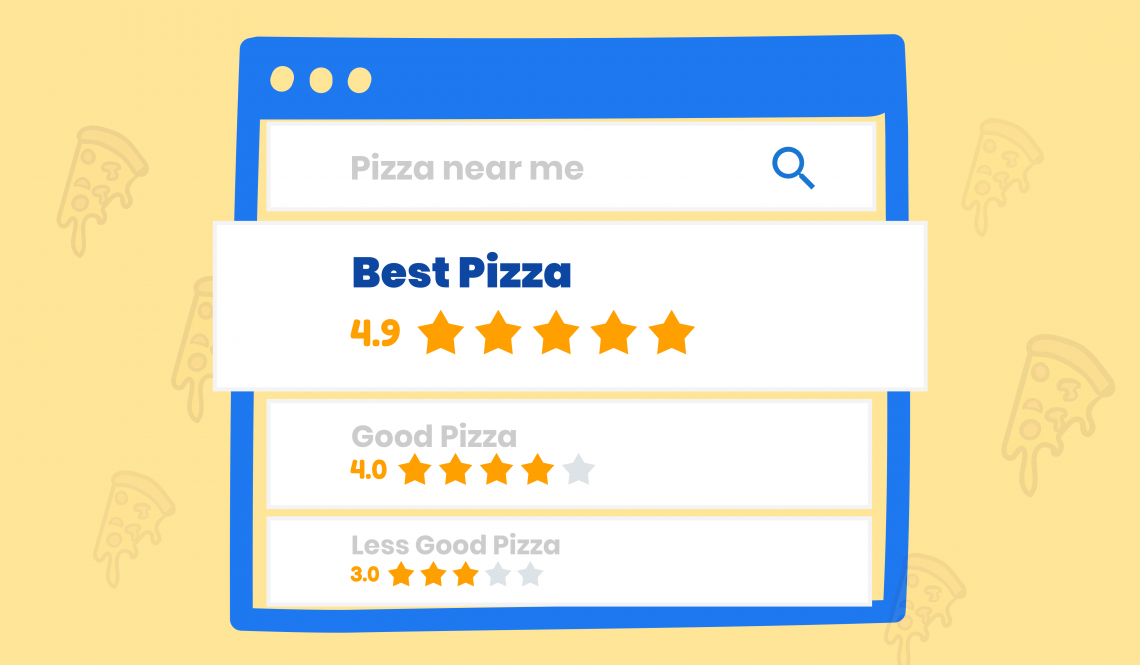Local business SEO is the practice of optimizing a company’s online presence across listings, reviews, and location-based content, so it appears in nearby search results like “near me” queries and Google Maps, driving more local visibility, foot traffic, and conversions.
Summary
Local business SEO helps multi-location brands get discovered where customers search most, on Google Search, Maps, and AI-powered discovery experiences. By optimizing listings, maintaining consistent business information, generating reviews, and creating locally relevant content, businesses can improve visibility, earn trust, and convert nearby searchers into customers.
This blog walks through the fundamentals of local SEO and actionable tactics to strengthen your presence across every location.
Table of contents
- What is local business SEO?
- Benefits of local SEO
- How do Google’s “near me” searches work?
- Tips for local SEO
- Optimize your Google Business Profile page
- Create content that is local and relevant
- Work on internal links
- Create a mobile-friendly site for better local business SEO
- Increase your social media engagement
- Have a consistent NAP
- Optimize online directories and citations for consistency
- Perform a local SEO audit
- Optimize your content for SEO
- Add locations to your website
- Participate in your local community
- Get more inbound links with high authority
- FAQs on local business SEO
What is local business SEO?
Local business SEO is a search engine optimization strategy that helps your business with its search visibility. This helps local businesses, primarily those with brick-and-mortar locations, to stand out from their competitors on online searches in their geographical area. Local SEO is increasingly relevant as 46% of all Google searches are performed by people looking for products, services, or information in their local area. That means improving your local search presence can clearly benefit your business.
If you want to attract more customers in your area, a local business SEO strategy should be an essential part of your marketing plan.
A strong local SEO strategy can help your business appear in local searches. This, in turn, can help you reach more people in your local area, attract more foot traffic, drive more conversions, and grow your business.
Benefits of local SEO
If you want to attract more local customers and grow your brand in your community, local SEO is something you need to focus on. Here are some of the benefits that local SEO provides:
- Better visibility online: When you focus on local SEO best practices, the likelihood of ranking higher on search results increases. Therefore, the higher you rank, the more customers will see your business and potentially visit your website.
- More traffic to your physical store: Your efforts to increase your local SEO presence will bring you more visitors to your website and drive customers to your physical store location. Because local SEO is focused primarily on the area around your business, you’re more likely to reach local customers who are willing to visit your store in person.
- Improve your online reputation: Once you learn how to do local SEO, you’ll find that more customers will find and visit your business, whether online or in person. When you actively ask happy customers to leave reviews, you will build a positive reputation with potential customers and continue to build upon it the more customers you get.
- Be more competitive: If your local competitors haven’t learned how to do local SEO marketing, you can get a step ahead of them by following your local SEO strategy. You will be more likely to reach more local customers than other businesses that aren’t actively focusing on local SEO.
- More trust, and more sales: As your presence grows online and in your community, you will become a trusted name to your local customers. More than ever, customers rely on positive reviews and a good reputation to choose the businesses they want to visit, and buy from. So, the better your local SEO efforts, the better your reputation, and the more customers are willing to purchase your products.
How do Google’s “near me” searches work?
Let’s look at a familiar scenario. When someone searches for a dentist, they’re usually looking for a provider close to home or work, not one across town. Convenience, relevance, and trust all play a role in that decision.
While people use many search platforms, Google remains the primary way customers discover local businesses. Understanding how Google surfaces nearby results is essential for any brand focused on improving local visibility, whether SEO is managed in-house or through an agency.
Google has stated that three main factors influence “near me” and local search results:
Distance
How close a business is to the searcher’s location. Proximity helps determine which locations are eligible to appear, but it doesn’t guarantee top placement.
Relevance
How well a business matches the search query. Accurate categories, services, and business information help search engines understand whether a location is a good fit for what the customer is searching for.
Prominence
How well-known and trusted a business is online. Prominence is influenced by factors like review volume and ratings, consistent listings, and overall visibility across the web. For example, a business with strong reviews and a well-optimized profile may rank higher than a closer competitor with limited or outdated information.
These signals help Google decide which businesses appear in local search results and in Google Maps, making consistent optimization across listings, reviews, and content critical for local SEO success.
Tips for local SEO
You can do a lot to improve your local search rankings. Here are 12 local search optimization tips for better local SEO results:
- Optimize your Google My Business page
- Create content that is local and relevant
- Work on internal links
- Create a mobile-friendly website
- Increase your social media engagement
- Have a consistent NAP
- Optimize online directories and citations
- Perform a local SEO audit
- Optimize your content for SEO
- Add locations to your website
- Participate in your local community
- Get more links with high-authority
Optimize your Google Business Profile page
Once again, Google is a huge asset to a business. Tap into this resource as much as you can. If you haven’t already, claim your Google Business Profile. If you have one already, update it with all your current information — location and address, contact information, working hours, parking, holidays — and update your profile with any information that you think is important to your customers.
The only thing worse than not having a Google Business Profile (GBP) page is having one with incorrect information. Research shows that 68% of customers stop using local businesses that have incorrect information in their listings.
Remember to verify your GMB page because verified businesses are twice as likely to be trusted by consumers.
One of Google’s recent changes is that GMB profiles that use keywords in descriptions will rank higher. Regarding this change, Google said, “The information in question is accurate. While it’s not guaranteed to improve the ranking, it could, depending on other factors, as well as information that is found online associated with the business.”
Ensure that your Google My Business page has all the keywords related to your business that your customers might be searching for.
Create content that is local and relevant
If you are trying to tell customers that you are a prominent local player, it’s time to make sure your content reflects that. It is important to create blog posts on topics relevant to your business with content curated for a local audience.
For example, if you are a regional bank with 50+ branches, creating blog posts that analyze the local housing market trends in your key operating cities, or offering guides specific to business lending regulations in those regions, is helpful.
Search engines value user-generated content like reviews and comments. By sending our regular review requests, you will ensure a steady stream of relevant content on your website, GMB page, and social media. Repeat after us: there is no such thing as too many reviews.
Work on internal links
Most businesses have a website, even if it’s a simple one that just gives customers contact information. However, the days of having just a homepage with contact information are long gone. Having enough content for search engines to crawl through and help you rank is strongly recommended. One way you can do this is by having a blog, as we discussed earlier in the blog post.
If you have a great blog with content that your reader loves, you can help it rank higher by creating internal links. Without going too much into the technicalities, internal links help search engines crawl through websites more easily. When you add internal links, search engines better understand how much content you have on your website and its relevance better when you add internal links.
In addition to having enough content to be able to create a good network of internal links, here are a couple of things to keep in mind:
- Use relevant links: Don’t just randomly link pages that are connected very faintly. The idea is to link to relevant pages on your websites that have things in common. If you are a dentist and have a blog about the importance of flossing and another blog about a healthy nighttime routine, it makes sense to link them.
- Use anchor text: This is important. Remember, Google is also becoming smarter every year. Anchor text is the link text or clickable text that takes a user to an HTML hyperlink. Highlight natural text fragments that are relevant to the topic and link away!
Create a mobile-friendly site for better local business SEO
Smartphone users often conduct local searches on their mobile devices. Chances are that if your website isn’t suitable for a mobile phone or takes forever to load, your customers will move on to the next search result. Search engines are similar.
While there is a lot that you can do to have a mobile-friendly site, here are two things you should be paying close attention to:
- Page speed: Google has indicated that its algorithm uses site speed as a signal to rank pages. You can make sure that you keep best practices for page speed in mind (think optimizing images, etc.)
- Website design: Avoid flashy elements and design your site for easy touchscreen navigation. If your website is too frustrating for the user to use on their phone, they may bounce.

Increase your social media engagement
Social proof is important for both your customers and for search engines. It can help your business drive revenue and attract new customers.
Social proof goes a long way in convincing potential customers to give your business a chance. Share your GMB page and other content (blogs, photos, your favorite reviews) on social media. This will help you rank higher in local business SEO.
Have a consistent NAP
Having consistent information on name, address, and phone number information (NAP) across listings is key to high rankings. The more consistent your business listings, the better your chance of ranking on ‘’near me’’ searches. These listings or citations are considered proof of prominence and are the 5th most important factor determining your local search ranking. Start by ensuring that your GMB profile information is correct. Once you’ve done that, maintain consistent information across all major sites like Facebook. Don’t forget to include industry-specific ones like ZocDoc as you make updates.
Optimize online directories and citations for consistency
If Google can’t figure out what business information is accurate when it looks at online directories, there’s a good chance that it won’t show your business in search results. That’s why you need to make sure that you optimize all listings in directories and citations for your business for consistency and accuracy.
You can look for a few things to ensure that your information is accurate across all your listings. For example, incorrect phone numbers or addresses, abbreviations, and misspellings can all impact how Google sees your business online. It’s also important to remove any duplicate listings on online directories to avoid confusing Google.
Perform a local SEO audit
SEO is a constantly changing process you must keep up with if you want to get ahead. You can do the research and make the changes you think are necessary, but you can also get a much more detailed idea of how your business is performing online with an SEO audit.
When you do an SEO audit of your business, you can make sure that important aspects of your online presence are functioning properly so you can rank higher in search results. You can conduct an audit of how your Google Business Profile is appearing in SERPs, how your on-page SEO is performing, whether your site can be crawled by Google, and how you compare to your competitors.
Optimize your content for SEO
This is much easier after an audit. Going forward, when you create a new piece of content like a blog, you must include all of the necessary details that search engines look for when ranking a piece of content. Therefore, if you want to rank, you need to know what parts of your blog need to include high-volume keywords.
When you write your content, ensure that you have your primary keywords included in your URL, title tags, meta descriptions, headers, and throughout the content itself. That way, Google will associate your content with the keyword you’re trying to target and keywords related to that topic too. Without adding keywords to those important parts of your content, Google will likely pass you by for the next piece of content that appears more relevant for that keyword.
Add locations to your website
If your business is multi-location, you need to include location pages on your website. Location pages will provide your visitors with the name, address, phone number, operating hours, and reviews for each of your individual locations directly on your website.
If you own a single-location business, you can still add your location on your “about us” page. That way your customers will have all the information they need after visiting your website to visit your store in person.
Participate in your local community
Not everything you do to improve your local SEO strategy has to be online. Getting directly involved in your community gives you great PR opportunities that translate to increased digital attention as a result. The more involved you are, the more attention you’ll get and the more you can direct your customers to your website.
For example, you can sponsor events in your community, get involved with your local Chamber of Commerce, or get yourself highlighted by your local media and drive that attention directly to your business online to boost your online presence. You can also ask those organizations to link back from their site to yours directly to increase your domain authority by building backlinks.
Get more inbound links with high authority
Speaking of links, building more inbound links from high authority sites can show Google that your business is reputable to your customers and rank you higher in search results. As we mentioned above, directly contacting organizations like your local Chamber of Commerce to link back to your site can help build your authority.
You can also consider guest posting on high-domain authority sites. You can reach out to specifically targeted websites with your own written content. This might appeal to them, allowing you to publish it on their site with a link back to your website. Some sites may require a fee to publish on their site. Even if in this case it can still be an effective way to build more links with higher authority to your site.
FAQs on local business SEO
Local business SEO focuses on helping your locations appear in geographically relevant searches like “near me” queries and Google Maps results. Unlike traditional SEO, which targets broader keywords, local SEO emphasizes proximity, business listings, reviews, and location-based content to attract nearby customers ready to convert.
.No. Local SEO is essential for multi-location brands and enterprises because each location competes independently in local search results. Without location-level optimization, even well-known brands can lose visibility to smaller competitors nearby.
Birdeye centralizes local SEO management in one AI-powered platform, helping businesses maintain accurate listings, generate and respond to reviews, track performance, and benchmark competitors. This ensures every location stays visible, trusted, and competitive in local search.
Yes. Birdeye’s Search AI helps businesses understand how their locations appear in AI-driven discovery tools like ChatGPT, Gemini, and Perplexity. By optimizing listings data and reviews, brands can improve visibility not just on Google, but wherever customers are searching next.
Birdeye: Your local business SEO powerhouse
Managing local SEO across multiple locations involves far more than rankings; it requires consistent listings, strong reviews, competitive awareness, and visibility across both traditional and AI-driven search experiences. Birdeye brings these capabilities together in a single, AI-powered platform built for multi-location businesses.
- Listings AI ensures accurate, consistent business information across Google, Apple, Facebook, and hundreds of directories, reducing errors that hurt local rankings.
- Reviews AI helps generate, monitor, and respond to customer reviews at scale, strengthening trust and improving prominence in local search.
- Insights AI provides location-level performance data and recommendations to identify what’s driving visibility and engagement.
- Competitors AI benchmarks your locations against local competitors to uncover gaps and opportunities.
- Search AI helps brands understand how their locations appear on AI search platforms such as ChatGPT, Gemini, and Perlexity, showing how listings data and reviews influence visibility beyond traditional rankings.
Together, Birdeye enables businesses to manage, optimize, and future-proof their local SEO strategy across every location, while staying visible wherever customers search.
Don’t just take our word for it. See Birdeye in action! Watch our demo to discover how Birdeye can help you conquer local SEO and take your brand to new heights.
Make local business SEO management a Breeze
Want to see the impact of Birdeye can have on your local business SEO? Watch the Free Demo Now.
Originally published









